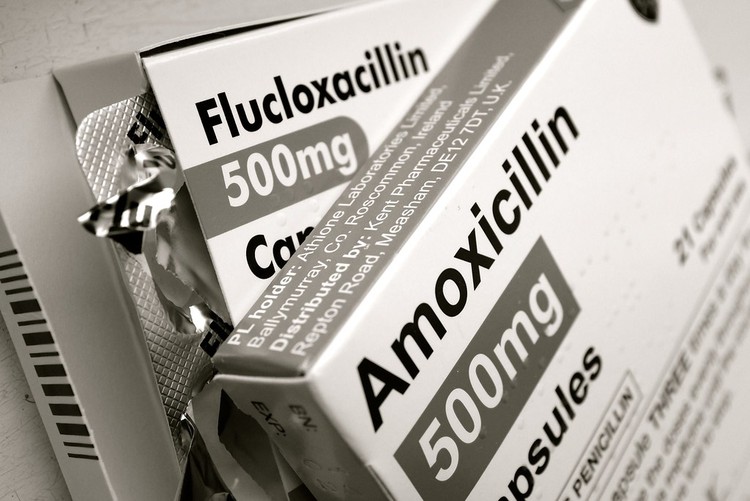
A South African study found that most doctors and nurses prescribed antibiotics for a viral infection even when patients discouraged them from doing so. Photo via Flickr by Chilanga Cement (CC BY 2.0)
30 April 2019
A century of medical progress is threatened by worldwide antimicrobial resistance. This is according to a new report released by the United Nation’s Interagency Coordinating Group on Antimicrobial Resistance (IACG). It concluded that drug-resistant diseases could cause 10 million deaths each year by 2050.
The report follows a South African study that has exposed very serious shortcomings with the way doctors and nurses are prescribing antibiotics.
Currently, at least 700,000 people die each year worldwide due to drug-resistant diseases, including 230,000 people from multidrug-resistant tuberculosis. More and more common diseases, including respiratory tract infections, sexually transmitted infections and urinary tract infections, are untreatable. Lifesaving medical procedures are becoming much riskier because of resistance to antibiotics.
“Misuse and overuse of existing antimicrobials in humans, animals and plants are accelerating the development and spread of antimicrobial resistance,” the IACG report states. It also points out that poor access to clean water and sanitation increases infections in humans and animals (and therefore the need for antibiotics to be used, increasing the risk of resistance developing).
According to the report, the World Bank estimates that the current cost of antimicrobial resistance measures is about US$9 billion annually (R126 billion) but investing this kind of money now could be cost-saving.
A study* done in a large metropolitan area in South Africa investigated unnecessary antibiotic prescribing. The results were presented at a Wits University workshop in March.
The study found that 78% of patients sent to a public clinic and 67% of patients sent to a private general practitioner (GP) were prescribed antibiotics even though antibiotics were unnecessary.
Dr Duane Blaauw from the Centre for Health Policy at Wits and Dr Mylene Lagarde from the Department of Health Policy at the London School of Economics made use of “mystery patients”. These are trained field workers who were sent to 120 private doctors and 73 public facilities to “present” with symptoms of acute bronchitis, but all of them were young and healthy. (The doctors and facilities — where the mystery patients were seen mostly by nurses — had agreed to participate in the study though they agreed to be unaware of who the patients were, when they would visit and what precisely they were trying to test.)
Antibiotics are not needed for acute bronchitis, because it is a viral infection (antibiotics treat bacterial diseases, not viral ones). Over 80% of doctors did recognise that the acute bronchitis is probably viral, but the study findings suggest that despite this knowledge they continued to prescribe antibiotics.
One reason given by primary care doctors and nurses to explain their unnecessary antibiotic prescribing is that patients demand or expect antibiotics. That did not happen in this study because the patients never asked for antibiotics.
A second group of patients was also sent. They explicitly told the doctors and nurses that they did not want antibiotics unless they were really necessary, but more than half still received it. The patients told the doctors and nurses they had a cough, runny nose and sore throat, but they did not have fever, chest pain, shortness of breath or any other significant symptoms.
The study found: “Public and private primary care providers do not follow recognised evidence-based guidelines in managing an uncomplicated case of acute bronchitis.”
Blaauw said: “Resistance has increased rapidly in the last decade or so, although the numbers depend on the bacterium and the drug. Some common bacterial infections now show very high rates of antibiotic resistance in South Africa. For example, over 85% of Streptococcus pneumonia, a common cause of pneumonia, are resistant to penicillin, over 60% are resistant to macrolides (a wide range of antibiotics), and more than 30% now show multidrug resistance.”
He said doctors and nurses know that antibiotic resistance is a serious problem but are not yet serious enough about how their own prescribing behaviour may be contributing to the problem.
“Unnecessary antibiotic prescribing is a complex problem. Antibiotics are not always bad. For certain infections they are absolutely necessary. The problem is that if they are prescribed when they are not indicated that may mean that they will be ineffective in the future when we actually need them for something else. But it is sometimes difficult to persuade health providers and patients about those future problems for other people,” Blaauw said.
The IACG report has recommended that countries need to plan and finance their responses to antibiotic resistance. They need to regulate antibiotic use and make sure there are awareness programmes for the responsible use of antibiotics, both in people and animals. There also needs to be research and development of new technologies to combat antimicrobial resistance. The use of critically important antibiotics to promote growth in agriculture must be phased out urgently.
Importantly, many countries in Africa have not yet signed up for the Global Antimicrobial Resistance Surveillance System.
* Pamphlet published by Wits University.